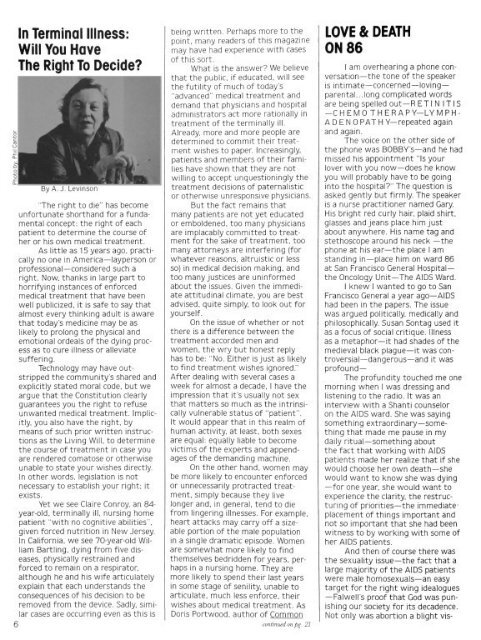view entire issue in pdf format - On The Issues Magazine
view entire issue in pdf format - On The Issues Magazine
view entire issue in pdf format - On The Issues Magazine
Create successful ePaper yourself
Turn your PDF publications into a flip-book with our unique Google optimized e-Paper software.
In Term<strong>in</strong>al Illness:Will You Have<strong>The</strong> Right To Decide?Lev<strong>in</strong>son"<strong>The</strong> right to die" has becomeunfortunate shorthand for a fundamentalconcept: the right of eachpatient to determ<strong>in</strong>e the course ofher or his own medical treatment.As little as 15 years ago, practicallyno one <strong>in</strong> America—layperson orprofessional—considered such aright. Now, thanks <strong>in</strong> large part tohorrify<strong>in</strong>g <strong>in</strong>stances of enforcedmedical treatment that have beenwell publicized, it is safe to say thatalmost every th<strong>in</strong>k<strong>in</strong>g adult is awarethat today's medic<strong>in</strong>e may be aslikely to prolong the physical andemotional ordeals of the dy<strong>in</strong>g processas to cure illness or alleviatesuffer<strong>in</strong>g.Technology may have outstrippedthe community's shared andexplicitly stated moral code, but weargue that the Constitution clearlyguarantees you the right to refuseunwanted medical treatment. Implicitly,you also have the right, bymeans of such prior written <strong>in</strong>structionsas the Liv<strong>in</strong>g Will, to determ<strong>in</strong>ethe course of treatment <strong>in</strong> case youare rendered comatose or otherwiseunable to state your wishes directly.In other words, legislation is notnecessary to establish your right; itexists.Yet we see Claire Conroy, an 84-year-old, term<strong>in</strong>ally ill, nurs<strong>in</strong>g homepatient "with no cognitive abilities",given forced nutrition <strong>in</strong> New Jersey.In California, we see 70-year-old WilliamBartl<strong>in</strong>g, dy<strong>in</strong>g from five diseases,physically restra<strong>in</strong>ed andforced to rema<strong>in</strong> on a respirator,although he and his wife articulatelyexpla<strong>in</strong> that each understands theconsequences of his decision to beremoved from the device. Sadly, similarcases are occurr<strong>in</strong>g even as this isbe<strong>in</strong>g written. Perhaps more to thepo<strong>in</strong>t, many readers of this magaz<strong>in</strong>emay have had experience with casesof this sort.What is the answer? We believethat the public, if educated, will seethe futility of much of today's"advanced" medical treatment anddemand that physicians and hospitaladm<strong>in</strong>istrators act more rationally <strong>in</strong>treatment of the term<strong>in</strong>ally ill.Already, more and more people aredeterm<strong>in</strong>ed to commit their treatmentwishes to paper. Increas<strong>in</strong>gly,patients and members of their familieshave shown that they are notwill<strong>in</strong>g to accept unquestion<strong>in</strong>gly thetreatment decisions of paternalisticor otherwise unresponsive physicians.But the fact rema<strong>in</strong>s thatmany patients are not yet educatedor emboldened, too many physiciansare implacably committed to treatmentfor the sake of treatment, toomany attorneys are <strong>in</strong>terfer<strong>in</strong>g (forwhatever reasons, altruistic or lessso) <strong>in</strong> medical decision mak<strong>in</strong>g, andtoo many justices are un<strong>in</strong>formedabout the <strong>issue</strong>s. Given the immediateattitud<strong>in</strong>al climate, you are bestadvised, quite simply, to look out foryourself.<strong>On</strong> the <strong>issue</strong> of whether or notthere is a difference between thetreatment accorded men andwomen, the wry but honest replyhas to be: "No. Either is just as likelyto f<strong>in</strong>d treatment wishes ignored."After deal<strong>in</strong>g with several cases aweek for almost a decade, I have theimpression that it's usually not sexthat matters so much as the <strong>in</strong>tr<strong>in</strong>sicallyvulnerable status of "patient".It would appear that <strong>in</strong> this realm ofhuman activity, at least, both sexesare equal: equally liable to becomevictims of the experts and appendagesof the demand<strong>in</strong>g mach<strong>in</strong>e.<strong>On</strong> the other hand, women maybe more likely to encounter enforcedor unnecessarily protracted treatment,simply because they livelonger and, <strong>in</strong> general, tend to diefrom l<strong>in</strong>ger<strong>in</strong>g illnesses. For example,heart attacks may carry off a sizeableportion of the male population<strong>in</strong> a s<strong>in</strong>gle dramatic episode. Womenare somewhat more likely to f<strong>in</strong>dthemselves bedridden for years, perhaps<strong>in</strong> a nurs<strong>in</strong>g home. <strong>The</strong>y aremore likely to spend their last years<strong>in</strong> some stage of senility, unable toarticulate, much less enforce, theirwishes about medical treatment. AsDoris Portwood, author of Commoncont<strong>in</strong>ued on pg. 21LOVE & DEATHON 86I am overhear<strong>in</strong>g a phone conversation—thetone of the speakeris <strong>in</strong>timate—concerned—lov<strong>in</strong>gparental...long complicated wordsare be<strong>in</strong>g spelled out—R ETI N ITIS-CHE MO THERAPY—LYMPH-AD E N 0 PAT H Y—repeated aga<strong>in</strong>and aga<strong>in</strong>.<strong>The</strong> voice on the other side ofthe phone was BOBBY'S—and he hadmissed his appo<strong>in</strong>tment "Is yourlover with you now—does he knowyou will probably have to be go<strong>in</strong>g<strong>in</strong>to the hospital?" <strong>The</strong> question isasked gently but firmly. <strong>The</strong> speakeris a nurse practitioner named Gary.His bright red curly hair, plaid shirt,glasses and jeans place him justabout anywhere. His name tag andstethoscope around his neck —thephone at his ear—the place I amstand<strong>in</strong>g <strong>in</strong>—place him on ward 86at San Francisco General Hospital—the <strong>On</strong>cology Unit—<strong>The</strong> AIDS Ward.I knew I wanted to go to SanFrancisco General a year ago—AIDShad been <strong>in</strong> the papers. <strong>The</strong> <strong>issue</strong>was argued politically, medically andphilosophically. Susan Sontag used itas a focus of social critique. Illnessas a metaphor—it had shades of themedieval black plague—it was controversial—dangerous—andit wasprofound—<strong>The</strong> profundity touched me onemorn<strong>in</strong>g when I was dress<strong>in</strong>g andlisten<strong>in</strong>g to the radio. It was an<strong>in</strong>ter<strong>view</strong> with a Shanti counseloron the AIDS ward. She was say<strong>in</strong>gsometh<strong>in</strong>g extraord<strong>in</strong>ary—someth<strong>in</strong>gthat made me pause <strong>in</strong> mydaily ritual—someth<strong>in</strong>g aboutthe fact that work<strong>in</strong>g with AIDSpatients made her realize that if shewould choose her own death—shewould want to know she was dy<strong>in</strong>g—for one year, she would want toexperience the clarity, the restructur<strong>in</strong>gof priorities—the immediate'placement of th<strong>in</strong>gs important andnot so important that she had beenwitness to by work<strong>in</strong>g with some ofher AIDS patients.And then of course there wasthe sexuality <strong>issue</strong>—the fact that alarge majority of the AIDS patientswere male homosexuals—an easytarget for the right w<strong>in</strong>g idealogues—Falwell's proof that God was punish<strong>in</strong>gour society for its decadence.Not only was abortion a blight vis-
















